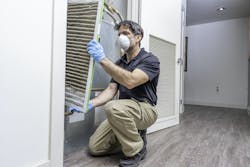Just as is true with residential contracting, commercial HVAC has a need for planned (or preventive) maintenance. Applied correctly, PMs help customers avoid major repairs, keep your team alert and always learning, and cement your reputation as a dependable provider with foresight.
We spoke with experts from three leading commercial HVAC businesses: Kahn Mechanical, Dallas, TX; Cox-Powell, Williamsburg, VA; and Temperature, Inc., Brentwood, TN. Cox-Powell and Temperature, Inc. are members of The Unified Group, a business support group for commercial HVAC contractors.
Contracting Business: What types of planned maintenance programs does your company provide?
Brittany Stultz, Kahn Mechanical: "Our first offering is regular routine maintenance, which can be quarterly, bi-annually, or monthly. Those consist only of maintenance visits. We also offer a labor and parts warranty, excluding refrigerants and that would also include the quarterly, bimonthly or biannual maintenance. We follow a process, and at a high level, our approach is to serve the client through evaluation, review and execution. The evaluation helps us understand the situation the best we can and see how we can help the client. Next, we'll review and discuss our recommendations, and how they are in the client’s best interests, and any customizing. In the execution stage, we’ll perform the PM cycle, typically quarterly. Throughout that cycle there will be recommendations."
Joe English, Kahn Mechanical: We refer to PM as 'planned maintenance', because It is both scheduled and preventive. As Brittany explained, the execution component is predominantly done quarterly, and at each quarter it could involve different procedures. Filters are replaced quarterly, but for a chiller that would be closer to semi-annual replacement. There are different tasks related to different equipment at different intervals, but those all must be well-communicated and scheduled based on availability of the facilities managers and our field technicians. That’s why we think of it as planned maintenance; a significant amount of planning goes into performing the service.
Paul Thurston, Cox-Powell: "We offer 50 percent service and maintenance and 50 percent special projects/service and maintenance, system installations, and Design/Build service and maintenance. We have a new business development team that reaches out to the prospects we’d like to work for. During a discussion, we describe the different types of programs we offer. We value maintenance agreements because they lead to replacement opportunities.
"We customize maintenance depending on what our customers needs are, and in most cases, the customers we call on, like Anheuser-Busch brewery or Phillip Morris, recognize the value of service and maintenance in preventing unplanned breakdowns.
"If we’re doing business with a new customer and we’ve gone through service and maintenance our first opportunity might be a small project. If we are doing a proposal to replace a piece of equipment and we’re not doing business with that customer, we will say we will maintain that piece of equipment in our proposal stage on an annual basis. "If we’re bidding against another contractor that is entrenched in that facility they may say they will have the existing in-house contractor handle it."
Contracting Business: Do you find building owners and managers are more open to planned maintenance?
Paul Thurston: Most of the people we call on understand they need to have maintenance for HVAC equipment, which is the largest energy user in the building. The only thing COVID did was help them sell UV lights to kill bacteria and fungi, and air quality improvements, such as more air changes or air turnover.
Contracting Business: Do you offer different levels of PM programs?
Paul Thurston: Our full-service plan is priced about three to four times higher than a normal PM, but it gives them an idea of what they can budget on an annual basis for their air conditioning. If they go with a full service program we also give them a very defined list of what is and is not included. For example, If refrigeration piping starts to leak because a lawn service employee cut a line it with lawn care equipment, that is not covered.
"If we’re servicing a chiller with six scroll compressors, or one that has a 200-ton screw compressor, if we have to replace the screw compressor that might be worth $30,000 or $40,000 dollars compared to a few thousand dollars for one scroll compressor. We offer clients with the larger machines an insurance policy with a deductible. That gives them a sense of relief since they can budget repairs on an annual basis."
Derren Saucier, Temperature, Inc.: "Yes, we’ll offer anything as basic as a filter service up to a full-coverage maintenance plan. The most basic beyond just a filter service is a basic PM service, which is a quarterly inspection and report on the findings. We also offer a labor contracts, in which we give them a monthly budgeted amount to cover labor for everything that is related to maintenance: inspections, repairs, emergency service, all the way up to full-service coverage, where we cover parts and material for a monthly bill that covers their HVAC cost, no matter what is might be. Temperature, Inc. manages many medical facilities, industrial, manufacturing and production, as well as institutional, schools, and churches. Our largest market is in large-scale commercial office spaces."
Contracting Business: Did COVID cause customers to feel a greater sense of urgency about preventive maintenance?
Brittany Stultz: It did, especially when we were deep in COVID, when things were shut down. We had clients that wanted filters with higher MERV ratings for their buildings, and clients that wanted us to replace filters monthly rather than quarterly. It’s not requested as much now, but some are still implementing changes because of COVID.
Joe English: We also offered the Decon7 cleaning protocol (from the National Air Duct Cleaning Association). We’re not necessarily doing much of that now but it is still offered.
(ed. note: Decon7 produces a proprietary EPA registered disinfectant, sanitizer, cleaner and deodorizer for HVAC and ductwork systems. The product kills viruses, bacteria and mold. D7 has the highest rating awarded by the EPAT. The company also keeps handy ASHRAE Standard 180 2018, which focuses on the inspection and maintenance of commercial buildings as a whole. It sets minimum requirements and standards for achieving acceptable thermal comfort, energy efficiency and indoor air quality.)
Derren Saucier: "The biggest change since COVID has been on the filtration side. It wasn’t broad spectrum request, but many wanted to upgrade their filtration. The industry also upgraded after that and now MERV-10 is the standard. We have facilities that went to MERV-13 and higher. Some are at 95% filtration on air handlers. That was the biggest change."
Contracting Business: Taking COVID out of the picture, do clients have a greater awareness of the importance of indoor air quality?
Joe English: More customers have three things that are driving them to do more preventive maintenance. One is that more organizations are what I would describe as culturally-driven, because they care more about their people, and want to provide a healthy workplace for them and at a time of low unemployment, if you want to get talent, you have to provide a good working environment.
Second, businesses across all marketplaces, sectors and industries are much more data-driven, and there is a lot of data that tells us that people work better in a healthy, happy, comfortable work environment. And so, while being culturally cognizant is much more altruistic, wanting higher performance from your team by providing a better working environment is certainly a little self-serving to the business at the same time.
Lastly, anytime you have mechanical systems in place, you should take care of them. Businesses realize that, from a data perspective, they will find issues before they become problems and [have the service provider] take care of them.
About the Author
Terry McIver
Content Director - CB
As director of content for Contracting Business, he produces daily content and feature articles for CB's 38,000 print subscribers and many more Internet visitors. He has written hundreds, if not two or three, pieces of news, features and contractor profile articles for CB's audience of quality HVACR contractors. He can also be found covering HVACR industry events or visiting with manufacturers and contractors. He also has significant experience in trade show planning.


